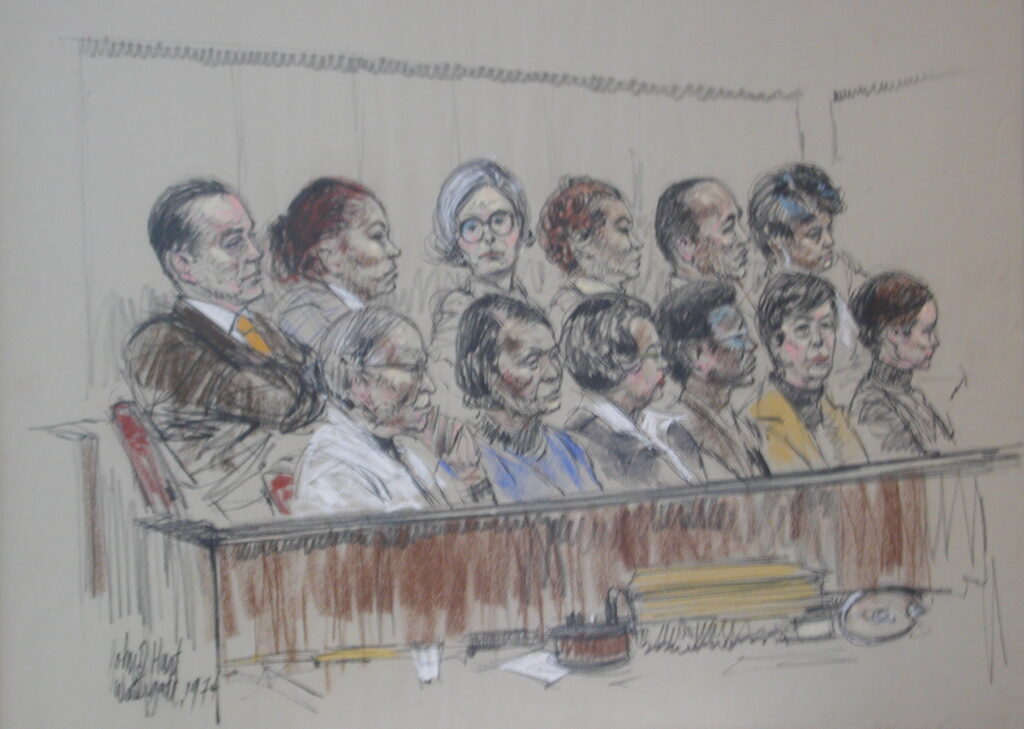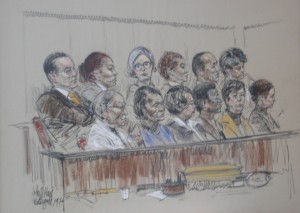
John Trumbull’s famous painting of the Declaration’s presentation hangs today in the Capitol Rotunda. It is collectively owned by the citizens of the United States.
A few days ago I wrote about an abomination of a bill that the House of Representatives narrowly passed, posing as tort “reform” in medical malpractice cases.
It wasn’t really “reform” (which implies improvement), but rather, a bill that seizes power from the states, grants protections and immunities to negligent people for their conduct that injures others, and foists much of the costs for those injuries out of the private sector and onto the wallets of the taxpayers.
But it did something else too, and I saved that for today. It also pissed on the Bill of Rights, specifically the Seventh Amendment.
Part of the law restricts pain and suffering awards to $250,000, and it also pushes many state actions into federal court.
The “problem” is the Seventh. It is a problem for those that want to seize federal power. Everyone else calls it a protection. Because that is what the Bill of Rights is, a list of protections.
For those that may have forgotten, the Seventh reads as follows:
In Suits at common law, where the value in controversy shall exceed twenty dollars, the right of trial by jury shall be preserved, and no fact tried by a jury, shall be otherwise re-examined in any Court of the United States, than according to the rules of the common law.
So the Founders decided that any significant suit (with $20 being the arbitrary limit) shall have the right of trial by jury. Notice that there is no arbitrary top limit?
Yet that is what a Republican majority of the House did — it imposed an arbitrary top limit that does not exist, thereby stripping away the constitutionally protected right to a trial by jury for the most seriously injured of people if this bill should become law.
That right to a jury trial goes way, way back to the Declaration of Independence for us. It is the reason that I refer to July 2nd as Jury Independence Day, because that is the day that the Declaration of Independence was voted on and passed by the Continental Congress. It was two days later, on the 4th, that the Declaration was signed, but John Adams thought that it was the second that would be the day “solemnized with Pomp and Parade, with Shows, Games, Sports, Guns, Bells, Bonfires, and Illuminations from one End of this Continent to the other from this Time forward forever more.”
I post on this subject each year, and the words that follow are an adaptation of those prior messages. And the Declaration of Independence is reproduced in full after that. I like to read it in full each year at this time.
————————-
The Declaration has, as its heart and soul, a discussion of how King George III seized too many powers. And the colonists believed — and were willing to risk their lives for the principles — that power should more justly reside with the people.
And so you will see, as but one example of “the long train of abuses and usurpations” charged against the British King that forms the Declaration’s bill of particulars, this:
For depriving us in many cases, of the benefit of Trial by Jury:
And in the subsequent Bill of Rights, there are three separate places where rights to a jury are established: In the Seventh Amendment (for civil trials), the Sixth Amendment (for criminal trials) and the Fifth Amendment (grand juries for capital or infamous crimes).
It is clear that the Founders wanted powers related to both civil and criminal fact-finding to reside with the people, and not with any head of state that may be subject to whim, politics or the pressures of the moment.
This tug-of-war over how much power should reside with government and how much with the people exists to this day. Speaking broadly, it is the conservatives who want to see a smaller, less powerful government and liberals a bigger and stronger one.
But oddly enough those principles seem to fall by the wayside in the discussion of tort “reform.” When it comes to that, some conservatives, for reasons that have never been explained to me, want to give various governmental protections and immunities to others so that wrongdoers can’t be effectively hauled before the court for accountability.
This abandonment of principle happens in the pursuit of …what? I can’t even finish the sentence as I still can’t fathom it, despite having written now on the subject for so many years.
To those conservatives that read this blog, I urge you to re-read our Declaration (and Bill of Rights) and ask yourselves why it is that, for this issue, principles of smaller and less powerful government have fallen by the wayside in favor of granting governmental protections and immunities.
And now, without further ado, Mr. Jefferson and his fellow congressmen:
————————
IN CONGRESS, JULY 4, 1776
The unanimous Declaration of the thirteen united States of America
When in the Course of human events it becomes necessary for one people to dissolve the political bands which have connected them with another and to assume among the powers of the earth, the separate and equal station to which the Laws of Nature and of Nature’s God entitle them, a decent respect to the opinions of mankind requires that they should declare the causes which impel them to the separation.
We hold these truths to be self-evident, that all men are created equal, that they are endowed by their Creator with certain unalienable Rights, that among these are Life, Liberty and the pursuit of Happiness. — That to secure these rights, Governments are instituted among Men, deriving their just powers from the consent of the governed, — That whenever any Form of Government becomes destructive of these ends, it is the Right of the People to alter or to abolish it, and to institute new Government, laying its foundation on such principles and organizing its powers in such form, as to them shall seem most likely to effect their Safety and Happiness. Prudence, indeed, will dictate that Governments long established should not be changed for light and transient causes; and accordingly all experience hath shewn that mankind are more disposed to suffer, while evils are sufferable than to right themselves by abolishing the forms to which they are accustomed. But when a long train of abuses and usurpations, pursuing invariably the same Object evinces a design to reduce them under absolute Despotism, it is their right, it is their duty, to throw off such Government, and to provide new Guards for their future security. — Such has been the patient sufferance of these Colonies; and such is now the necessity which constrains them to alter their former Systems of Government. The history of the present King of Great Britain is a history of repeated injuries and usurpations, all having in direct object the establishment of an absolute Tyranny over these States. To prove this, let Facts be submitted to a candid world.
He has refused his Assent to Laws, the most wholesome and necessary for the public good.
He has forbidden his Governors to pass Laws of immediate and pressing importance, unless suspended in their operation till his Assent should be obtained; and when so suspended, he has utterly neglected to attend to them.
He has refused to pass other Laws for the accommodation of large districts of people, unless those people would relinquish the right of Representation in the Legislature, a right inestimable to them and formidable to tyrants only.
He has called together legislative bodies at places unusual, uncomfortable, and distant from the depository of their Public Records, for the sole purpose of fatiguing them into compliance with his measures.
He has dissolved Representative Houses repeatedly, for opposing with manly firmness his invasions on the rights of the people.
He has refused for a long time, after such dissolutions, to cause others to be elected, whereby the Legislative Powers, incapable of Annihilation, have returned to the People at large for their exercise; the State remaining in the mean time exposed to all the dangers of invasion from without, and convulsions within.
He has endeavoured to prevent the population of these States; for that purpose obstructing the Laws for Naturalization of Foreigners; refusing to pass others to encourage their migrations hither, and raising the conditions of new Appropriations of Lands.
He has obstructed the Administration of Justice by refusing his Assent to Laws for establishing Judiciary Powers.
He has made Judges dependent on his Will alone for the tenure of their offices, and the amount and payment of their salaries.
He has erected a multitude of New Offices, and sent hither swarms of Officers to harass our people and eat out their substance.
He has kept among us, in times of peace, Standing Armies without the Consent of our legislatures.
He has affected to render the Military independent of and superior to the Civil Power.
He has combined with others to subject us to a jurisdiction foreign to our constitution, and unacknowledged by our laws; giving his Assent to their Acts of pretended Legislation:
For quartering large bodies of armed troops among us:
For protecting them, by a mock Trial from punishment for any Murders which they should commit on the Inhabitants of these States:
For cutting off our Trade with all parts of the world:
For imposing Taxes on us without our Consent:
For depriving us in many cases, of the benefit of Trial by Jury:
For transporting us beyond Seas to be tried for pretended offences:
For abolishing the free System of English Laws in a neighbouring Province, establishing therein an Arbitrary government, and enlarging its Boundaries so as to render it at once an example and fit instrument for introducing the same absolute rule into these Colonies
For taking away our Charters, abolishing our most valuable Laws and altering fundamentally the Forms of our Governments:
For suspending our own Legislatures, and declaring themselves invested with power to legislate for us in all cases whatsoever.
He has abdicated Government here, by declaring us out of his Protection and waging War against us.
He has plundered our seas, ravaged our coasts, burnt our towns, and destroyed the lives of our people.
He is at this time transporting large Armies of foreign Mercenaries to compleat the works of death, desolation, and tyranny, already begun with circumstances of Cruelty & Perfidy scarcely paralleled in the most barbarous ages, and totally unworthy the Head of a civilized nation.
He has constrained our fellow Citizens taken Captive on the high Seas to bear Arms against their Country, to become the executioners of their friends and Brethren, or to fall themselves by their Hands.
He has excited domestic insurrections amongst us, and has endeavoured to bring on the inhabitants of our frontiers, the merciless Indian Savages whose known rule of warfare, is an undistinguished destruction of all ages, sexes and conditions.
In every stage of these Oppressions We have Petitioned for Redress in the most humble terms: Our repeated Petitions have been answered only by repeated injury. A Prince, whose character is thus marked by every act which may define a Tyrant, is unfit to be the ruler of a free people.
Nor have We been wanting in attentions to our British brethren. We have warned them from time to time of attempts by their legislature to extend an unwarrantable jurisdiction over us. We have reminded them of the circumstances of our emigration and settlement here. We have appealed to their native justice and magnanimity, and we have conjured them by the ties of our common kindred to disavow these usurpations, which would inevitably interrupt our connections and correspondence. They too have been deaf to the voice of justice and of consanguinity. We must, therefore, acquiesce in the necessity, which denounces our Separation, and hold them, as we hold the rest of mankind, Enemies in War, in Peace Friends.
We, therefore, the Representatives of the united States of America, in General Congress, Assembled, appealing to the Supreme Judge of the world for the rectitude of our intentions, do, in the Name, and by Authority of the good People of these Colonies, solemnly publish and declare, That these united Colonies are, and of Right ought to be Free and Independent States, that they are Absolved from all Allegiance to the British Crown, and that all political connection between them and the State of Great Britain, is and ought to be totally dissolved; and that as Free and Independent States, they have full Power to levy War, conclude Peace, contract Alliances, establish Commerce, and to do all other Acts and Things which Independent States may of right do. — And for the support of this Declaration, with a firm reliance on the protection of Divine Providence, we mutually pledge to each other our Lives, our Fortunes, and our sacred Honor.



